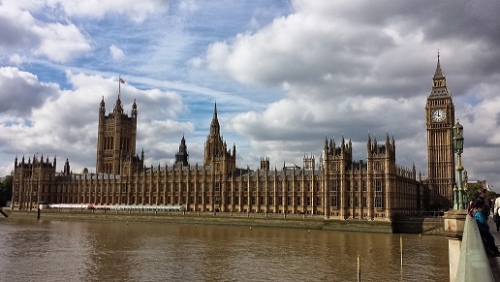Statistics
UK Economy Contracts In 2Q 2022 – Reactions

After new figures published on Friday show that the UK economy contracted less than expected by analysts in the second quarter of 2022, investment managers discuss the outlook, the mounting risk of recession and what this will mean for interest rates.
Official figures released by the Office
for National Statistics show that UK gross domestic product
shrank by 0.1 per cent in the second three months of the year,
less than the 0.2 per cent contraction forecast by analysts.
It comes after GDP rose by 0.8 per cent in the first three months
of the year. The figures also follow the Bank of England's
warning last week that it expects the UK economy to enter
into a recession in the fourth quarter of 2022 and that inflation
would reach 13.3 per cent in October.
Here are some reactions to the figures from investment
managers.
Tom Hopkins, portfolio manager, BRI Wealth
Management
“UK GDP came in at -0.1 per cent in the second quarter 2022,
marginally better than the -0.2 per cent consensus
expectation. Despite this reading beating expectations, the
figure still shows the UK in negative growth which comes
as no real surprise as the UK is at a growing risk of
slipping into a technical recession.
“The contraction can be attributed to a weak level of activity in
June, in the wake of the extended bank holiday to celebrate the
Queen’s jubilee –additionally, rampant inflation,
exacerbated by the war in Ukraine and pandemic-related supply
chain disruptions, and the deepening cost-of-living crisis.
“Last week the Bank of England gave a very gloomy outlook for the
UK economy, predicting that the UK is heading for a 15-month
recession. They also predicted that inflation would peak at 13
per cent and remain above 10 per cent for much of 2023 resulting
in the worst hit to household living standards in 60 years.
Notably the pound is one of the worst performing out of the G10
currencies this year, having fallen almost 10 per
cent against the US dollar in 2022. In the MPC’s view,
trying to curb these pressures requires painful medicine: higher
interest rates to slow demand and to take some of the heat out of
the jobs market even as high energy prices are already
squeezing consumer incomes. As we look at other economies, the US
is in a technical recession and if the rest of the EU, too,
slides into recession, then maintaining much economic momentum
here will become difficult.”
Azad Zangana, senior European economist and strategist,
Schroders
“Better-than-expected UK economic performance may come at the
cost of higher interest rates as the Bank of England shows a new
focus on taming inflation.
“The expenditure breakdown shows that the winding down of
Covid-related activity had a significant negative impact on
government spending. Human health and social work activities fell
by 5.4 per cent, as government spending overall fell 2.9 per cent
in real terms. This was the largest drag on GDP over the quarter,
contributing -0.6 percentage points (ppts). Household consumption
fell, shaving 0.1 ppts from GDP, while the external sector and
inventories helped offset some of the decline. Net trade added
1.1 ppts as export volumes grew by 2.4 per cent while imports
declined by 1.5 per cent. It’s worth mentioning that over the
first half of the year, exports were down 2.1 per cent while
imports were up 8.8 per cent, and so the latest trade figures are
not yet cause for celebration.
“Higher inflation is also playing a role in depressing real GDP.
In nominal terms, the economy grew 1.1 per cent over the quarter,
including 2.6 per cent growth in household expenditure. This
pattern is likely to continue over the next year, as rising
inflation reduces spending and output in real terms, even if
growth continues to be positive in nominal terms.
“Looking ahead, we should see a small bounce in the economy in
the third quarter as the impact from the extra bank holiday
reverses. As we enter the winter months, however, higher energy
bills are likely to seriously hit household spending, potentially
causing a recession by early next year.
“The new Prime Minister is likely to attempt to the ease pressure
of the cost-of-living crisis with tax cuts, even if it adds to
wider inflation pressures across the economy. Meanwhile, the Bank
of England is likely to keep raising interest rates. The
better-than-expected GDP figures help support the view that the
BoE can raise interest rates again by 0.5 per cent at its next
policy meeting.”
Shweta Singh, senior economist, Cardano
"This morning’s [Friday 12 June] GDP data release for June and
the second quarter of 2022 shows a mixed picture of the UK
economy’s health. The underlying details of the release reveal
the severe squeeze on consumers from high inflation.
“While the positive trends in business investment may be
difficult to maintain with the expiry of ‘super-deduction’ in
taxes in early 2023, it is the consumption categories,
particularly the household sector, where we see the UK’s
underlying economic vulnerabilities lie.
“Weaker consumption could lead to a potentially sharp reversal of
the primary growth driver of the last year. As nominal wage
growth struggles to keep up with accelerating inflation into the
autumn, we expect there to be further spending restraint by
households, particularly in discretionary sectors. Conversely, we
do expect fiscal spending to pick up as the government’s cost of
living package gets underway more fully.
“In summary, the UK economy faces powerful headwinds. Consumers –
the erstwhile growth drivers – will struggle the most, while
capex and exports will likely fail to fill the gap adequately.
Fiscal policy will help but will be unable to offset the drag
from dwindling private consumption and investment.”